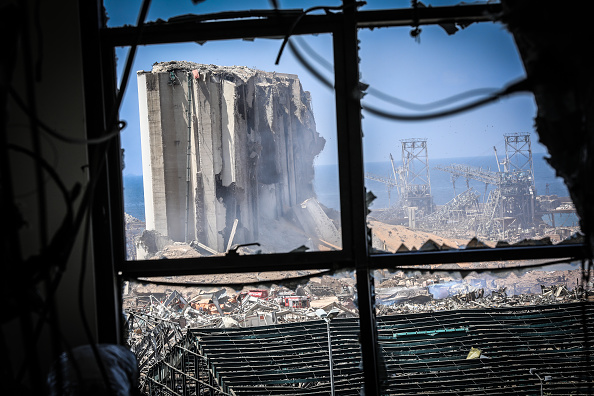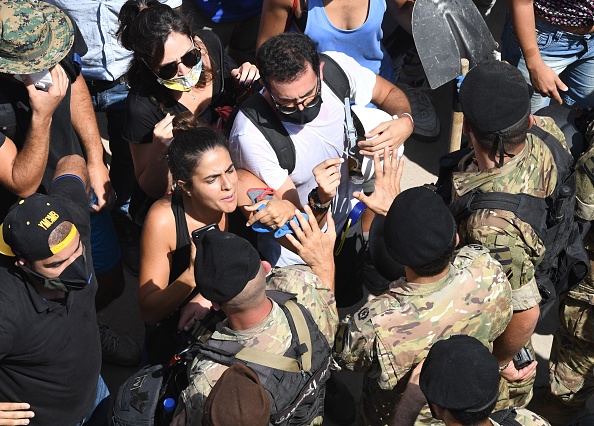These economic hardships have led to mass protests in late 2019 and early 2020. These protests have called for the entire government, including Hezbollah, to be ousted. While long term Prime Minister Saad Harriri resigned from his post, Michel Aoun (another Hezbollah ally) remained as President. Furthermore, Hezbollah’s grip on the government remained. The pandemic proved to be both a blessing and a curse for Hezbollah; this is because the risks of the coronavirus forced protesters to leave the streets and stay home, but at the same time a health crisis was the last thing the government needed. The government’s inability to maintain public hospitals and lack of a plan to carry on the academic year highlighted its inefficiencies and added to the impetus of protesters’ narratives.

BEIRUT BLAST BRINGS BACK HEZBOLLAH SCRUTINY
This week, Japan marked the 75th anniversary of the Hiroshima and Nagasaki bombings; however unbeknownst to the world another explosion would make international headlines during the week. On August 4, a massive explosion happened at the heart of Lebanon’s capital. While the explosion was only 10 per cent as lethal as that of the Hiroshima and Nagasaki bombs, it was still large enough to be felt in neighbouring Cyprus. The explosion also caused the same impact as a 3.3 magnitude earthquake, and more importantly the blast killed 137 people and injured at least 5,000 more. The Lebanese government has declined to accuse any entity for the explosion and has instead stated that it would undertake an investigation over the cause of the blast. In spite of the government’s silence, reports that came hours following the explosion indicated that the warehouse that exploded had 2,750 tonnes of ammonium nitrate. The chemical substance is often used as a fertiliser, however its explosive properties have made it a lucrative weapon of choice for several terrorist and militant groups. Furthermore, most evidence so far suggests that Hezbollah most likely stockpiled the substance years prior to the blast and stored it in the Beirut warehouse. As of the writing of this piece, Hezbollah Secretary General Hassan Nasrallah has yet to address the explosion. He was scheduled to deliver a speech on Wednesday August 6, but he has since delayed his address.
WEAPON OF CHOICE FOR HEZBOLLAH
According to a recent article published in the Jerusalem Post, ammonium nitrate is a common weapon of choice for Hezbollah. In 2015, the UK’s intelligence service MI5 found three metric tonnes of ammonium nitrate in a storehouse in London. Furthermore, an article published in the Telegraph last year stated that British police found and confiscated ammonium nitrate in four northwest London properties; the substances were stored in ice packs in an attempt to hide them from authorities. Hezbollah was the culprit in both incidences, as in the aftermath of the latter discovery a Hezbollah member was arrested in suspicion of plotting a terror attack. In similar vain, German intelligence services and Mossad were able to uncover ammonium nitrate in southern Germany, which was gain traced back to members of the group. Once again the substance was hidden inside of ice packs to delude security forces. It should be noted that while ammonium nitrate was found in both the UK and Germany, it was unclear whether or not the group intended to use it inside those countries.
One of the major reasons why Hezbollah was allowed to operate this freely within Europe is due to the fact that many EU states have insisted on distinguishing between the group’s military wing and political wing. While the military wing has historically been classified as a terrorist group by London and Berlin, the political wing has long been except from this classification. As a result, the group has been able to run many “charity organizations and events” within Europe, and the group has been using funds collected under these auspicious activities to fund the group’s military operations. While these governments have been attempting to be diplomatic in distinguishing the group’s wings, it should be noted that Hezbollah itself does not see itself as an organisation made up as different entities. In fact, Deputy Secretary of the group once went on to say: We don’t have a military wing and a political one; we don’t have Hezbollah on one hand and the resistance party on the other.”
Nevertheless, both London and Berlin would eventually take the steps necessary to halt the group’s operation within their soil. In 2019, the UK government would designate the group in its entirety, as a terrorist organization while the German government would follow suit in 2020.

FRANCE AND CANADA ALREADY SHOWING HESITANCE
Following the explosion, many world governments would pledge millions of dollars in humanitarian relief effort. The UK government offered 5 million British pounds in emergency relief aid, while the US government started sending aid on Thursday, just two days after the blast.
However, the biggest impact so far came from the French government, as President Emmanuel Macron became the first leader to visit Beirut after the explosion. During the visit Macron indicated that radical reforms were needed within the Lebanese government. He also stated that his government would send relief aid to Lebanon, however he iterated that the funding would not fall into “corrupt hands” within the government and that it would instead go directly to relief organisations working on ground.
Similarly, Canadian International Development Minister Karina Gould said that Canada would not send humanitarian aid directly to the Lebanese government and that it would instead send it to “trusted” humanitarian organisations. She would go on to say that if the Lebanese government were to receive financial aid, then it would have to use it for fiscal and political reforms, which would improve the lives of Lebanese people.
The statements coming from French and Canadian leadership show that most world governments no longer trust the Hezbollah backed government. Furthermore, the world is now aware that Hezbollah is not willing to implement any real reforms in Lebanon, and will only use any financial aid to fund its region destabilising activities. Now more than ever, the world is backing the Lebanese people who are seeking major political reforms within the country. The current government has now lost legitimacy both within and outside Lebanon, as such the country now has a unique opportunity to pave the way for real political change.









